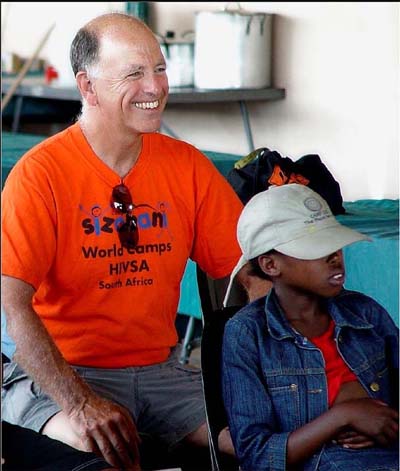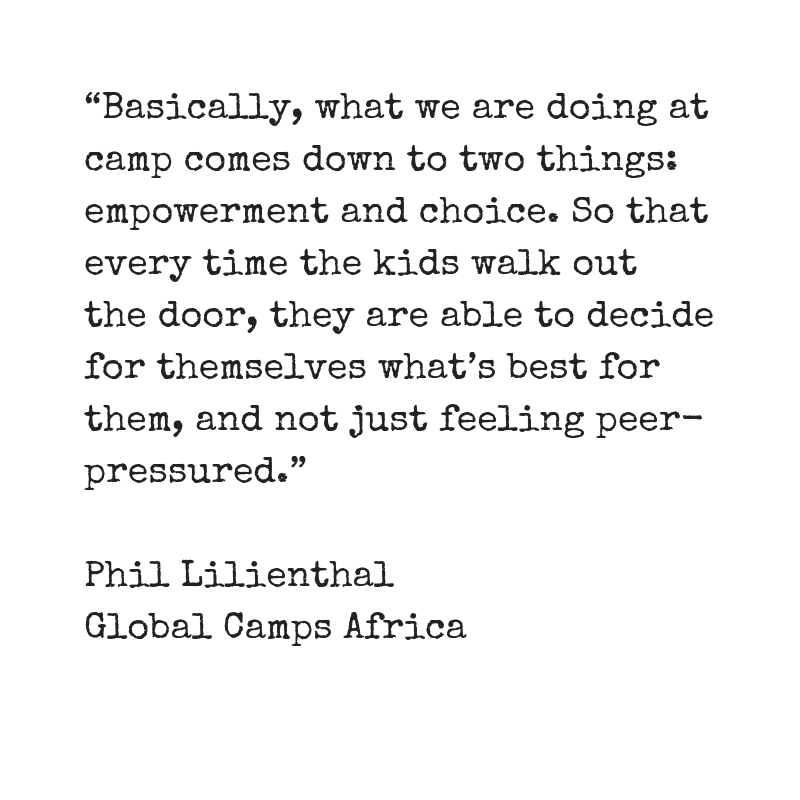Ep. 62: Creating Change Around the World Through the Power of Camp with Phil Lilienthal

When the (campers) get home, parents and teachers, without knowing who’s been to camp, can always tell. Their whole attitude changes. They have more confidence.
Phil Lilienthal
In Episode 62, I’m chatting with Phil Lilienthal of Global Camps Africa. We talk about his early Peace Corps experience in Ethiopia, forming Camp Langano, spending the next 30 years running Camp Winnebago in Maine, and what led him out of retirement to establish a week-long camp for teens in South Africa.
Global Camps Africa provides week-long camps, day camps and continuing education programs, which combine life skills training with recreational activities, changing the lives of South Africa’s most vulnerable youth.
BIG IDEAS
- Phil Lilienthal’s early life experience in Africa ignited his passion to take the camp experience to the world outside of the US.
- His vision is to use camp as a vehicle for meeting the needs of developing youth in impoverished communities. He hoped, like “Johnny Appleseed”, the idea would spread throughout Africa.
- He realized the importance of integrating the life skills component into the camp experience and developed a curriculum for summer camp, as well as for local clubs that could reinforce the lessons learned at camp.
- The curriculum features topics such as sex education, disease prevention, abusive behaviors, gender bias, xenophobia, drugs and alcohol, crime, reproductive health, parenting, financial literacy, and leadership.
- Campers learn and develop skills needed to be successful in all areas of life. Many receive training to eventually become camp counselors, as well.
- Trained South African counselors are available to work in the USA during the summer months.
Consider contributing or raising funds to support South African campers. The cost per child for the 8-day camp program and year-long youth club membership is $500, which not only supports the educational experience but also helps to launch a child into productive citizenship.
QUOTES
Phil: “What are the biggest issues (these kids) face in life, in reaching a healthy productive adulthood? Let’s figure that out and then train our counselors on how to remedy that and give them the information they need. We did! We were able to cover discussion topics that were taboo to talk about in the home.”
Phil: “For (the kids) to see foreigners down on their hands and knees, playing with them or talking to them … just saying, ‘what do you think?’ is something they never hear.”
Phil: “It’s really beautiful to watch. The counselors all have a way of discussing a subject that is non-judgmental…We have people line up on either side, they discuss back and forth, and people are challenged, not only to confront their prejudices and assumptions about something but to think about it – that there are two sides to the issues and weigh the consequences.”

Audrey: “What a powerful thing just to get these kids thinking about making their own decisions. So whatever life skill you’re talking about, just having them have the time to reflect is very powerful because a lot of kids don’t ever take any time to make a decision before they’re in a situation, and that’s the problem. But if they’ve had time to think things through and have all this discussion, that’s got to be helpful to them and empowering, knowing that they do have more choices and decision-making power than going along with what other people are doing. ”
Audrey: “It really resonates with me because it is about wellbeing. It’s about teaching these kids how to become thriving adults. You are giving them the tools and teaching them skills that will change the trajectory of their lives.”
LINKS
More Info on Global Camps Africa (PDF)
Mother Bear Project in Minneapolis, MN
RELATED POSTS/PODCASTS
If you liked this episode, you might want to listen to Episode 18, where I interview camp director Tom Holland about teaching children leadership skills and how to approach life with wonder and joy.

